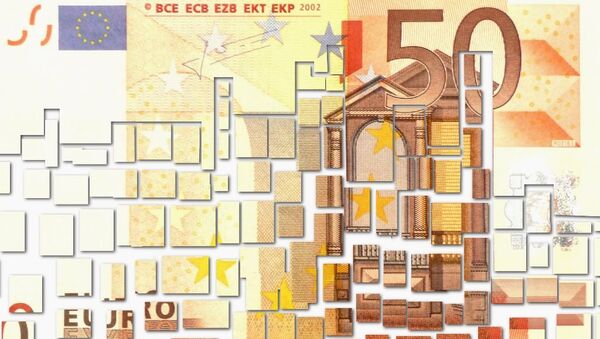French Economy Minister Emmanuel Macron has called for a single government for the euro, capable of making centralized decisions over the single currency — rather than the euro being the sum of 19 different financial systems of each of its members. He also raised the horny issue of fiscal transfer — whereby the Eurozone could make fiscal transfers from rich to poorer states.
Eurozone's fate in street art #elections2015_round2 #Euro #streetart #laiki_enotita #austerity #Grexit #GreeceCrisis pic.twitter.com/0iD4uy8hw0
— Θάνος Δ. (@scyldunjel) August 22, 2015
"If we want a genuine economic and monetary union, we must force it. For us French, it means that we bring in reforms that break old habits. And it also requires breaking taboos in Germany," he said.
"If Member States are not ready for any form of financial transfers within the monetary union, we can forget the euro and the Eurozone."
However, the German Vice Chancellor Sigmar Gabriel rebuffed the idea saying: "To my French colleagues, I say 'You need to flesh this out'. Money must be generated for the Eurogroup budge. My big concern is that next someone will have the idea that this will be raised from ordinary people with a euro tax, or a value-added tax. I would be strictly against that."
The spat goes to the heart of the Eurozone problem: it is a single currency that attempts to hold together 19 nations, each with its own set of fiscal policies. Rates of tax — especially corporation tax and VAT — vary throughout the Eurozone. There are differing pension schemes — highlighted by the recent third bailout for Greece, where people have been able to retire much earlier than the rest of Europe and enjoy unsustainably high state pensions.
Essentially, each member state of the euro has a political leadership that dictates economic policy for a domestic agenda.
'Monetary Union Will Remain Imperfect'
Macron said: "For years we have tinkered with rules meant to help countries in crisis. But they have not helped enough.
"The Eurozone needs new institutions to which national governments transfer more sovereignty: a strong European economic government, with its own budget. This government would be obliged to act in the sole interest of the entire currency area."
His comments echo those of Benoît Cœuré, a Member of the Executive Board of the European Central Bank (ECB), who last week said the current crisis in the Eurozone represents a fundamental test of the monetary union's ability to achieve the dual objective of economic and political commonality.
Coeuré: The intergovernmental decision-making process in the euro area would condemn us to a future of low growth and repeated crises
— ECB (@ecb) August 27, 2015
Cœuré said:
"Our institutional framework is not yet sufficient to complete Economic and Monetary Union when it comes to economic, fiscal and financial matters. The European Central Bank does not currently have a strong political counterpart in these areas."
"Thus, our monetary union will remain imperfect, will not be as prosperous as it could be and will face the risk of repeated crises if we fail to address our economic and political differences," he said.
Back in Berlin, Ralph Brinkhaus, deputy leader of Angela Merkel's party said: "This is not the time to demand a fundamental renewal and further deepening of the European Union. First of all we need to get to the point where the member states stick to the jointly agreed rules, for example on financial stability."



